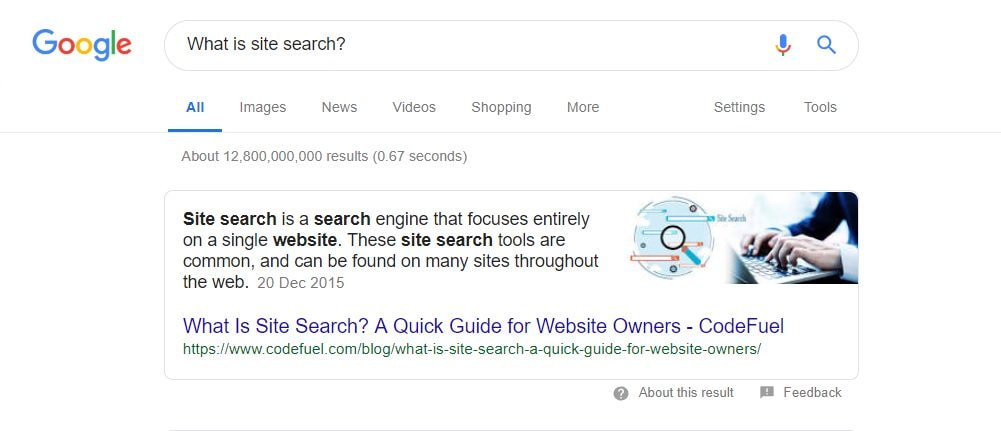
What is semantic search?
Semantic search is a relatively new concept in the world of web search and has a long way to go before it lives up to its promise. However, it certainly has an important role to play in the future of the technology, so it's important you know what it is and its likely impact on your websites.
What is semantic search?
Semantic search, put simply, is a search engine which understands language as well as a person would – taking into account not just the words used, but their context and the searcher’s intent.
The term ‘semantics’ refers to the many different meanings of words, the connections between them, and their context. Language, it goes without saying, is complicated. The same word can have many different meanings depending on the semantic context it’s used in.
As an example, the phrase ‘bear with me’ is understood to mean ‘give me a moment’, not ‘I’m with a bear’. ‘Getting the computer up and running’ means ‘switching it on’, not ‘I’m off for a jog with my MacBook’.

'Bear with me'
This level of language comprehension may seem like second nature, but writing software that understands something so complex is no mean feat. However, thanks to developments in AI, like natural language processing and machine learning, search engines of the future will interpret language as easily as we do.What does semantic search mean for your website? Learn everything you need to know in our ultimate guide.
Why does it matter?
The introduction of semantic search technology, first discussed by Google back in 2012, has already transformed the way we search the internet. Google, which accounts for 92% of the search market, has heavily invested in semantic search over the last few years. In the past, everything in Google’s search index was ranked based on keywords.
If you asked Google in 2010 ‘what’s the weather like?’, you would have been presented with a list of weather forecast websites. You may have even had to wade through countless results that matched those key words exactly, perhaps explaining 'what the weather is like in Orlando', for example.
Today, the same search will give you up-to-date weather information, tailored to your location, right there at the top of the search results.
This is because Google’s algorithm is understanding your intent. It knows you’re not interested in where you get the information, and that you don't want it to return results exactly matching the specific words you typed, you simply want to know the weather.
But why does it matter for my site?
Frankly, Google has spoiled internet users. People are so used to semantic search giving them exactly what they want when they search for it that they expect the same from your on-site search.
Here are some different types of websites with examples of how semantic search is likely to impact each of them.
E-commerce Sites
E-commerce is one area where semantic site search can really shine. Giving your customers the ability to narrow down your items to what they're specifically looking for (e.g. size 10 blue dresses under $50) gives them a similar experience to talking to a personal shopper. This more personal experience will help your business stand out from the crowd – a shocking number of the big retailers still can't handle even basic semantic search. Here's what happens when you search the H&M site for ‘blue dresses under £50’: 
You probably don’t need me to tell you how bad 'no results' pages are for conversion rates – if your customers don’t find what they’ve searched for, they’ll just search elsewhere.
In fact, according to a study by Total Retail, on average, e-retailers that featured a semantic search bar experienced a tiny 2% cart abandonment rate, compared to a 40% rate on sites featuring basic text search.
It’s clear that semantic search is an excellent development for e-commerce – your customers can search more specifically, and your business will make more money. Win-win.
Content Sites
Google's semantic search capabilities are getting better all the time, so it's increasingly important to ensure that content is written with readers, not search engines, in mind and always aim to create quality content that offers real value to your audience.
This is crucial because – thanks to semantic search – Google will display a 'featured snippet' of your article on their results page if it’s popular and succinctly answers a question, shining a spotlight on your website. As an example of what we mean, look at what happens when you ask Google ‘What is site search?’:

While semantic search won't automatically rank you higher in Google search results, this can work wonders for your website’s unique visits as it’s likely people will click straight to your site for more information. After all, they know it will definitely answer their question.
And, once they're on your site, visitors will have a much better experience if you have semantic search available – they won't be forced to go back to google to find the content they're looking for.
Similar to how semantic search works as a personal shopper in e-commerce, on a content-heavy site, it acts as a curator, delivering your visitors what they're looking for but also making further content suggestions they may find interesting.
Educational Sites and Libraries
Semantic search can be a real boon for researchers and students. With many thousands of papers and articles accessible via online resource sites, making the task of sifting through them easier, speedier, and more accurate is extremely helpful.
We’re not too far away from a world in which a student could ask a question on a university’s library website, in the same natural way they’d ask a lecturer, and find the research papers that answer that question – alongside references and citations – right there in the search results.
Summary
It’s clear to see that by better understanding intent and context, semantic search will make finding the right content easier for everyone. While there are a few solutions available offering this functionality, Site Search 360 is a leading expert in the field for site search. Start a free trial today and see for yourself how semantic search can take your website up a gear.
Interested in finding out more about the benefits of adding a search tool with semantic search to your site? Check out our introductory guide to semantic search for websites:
